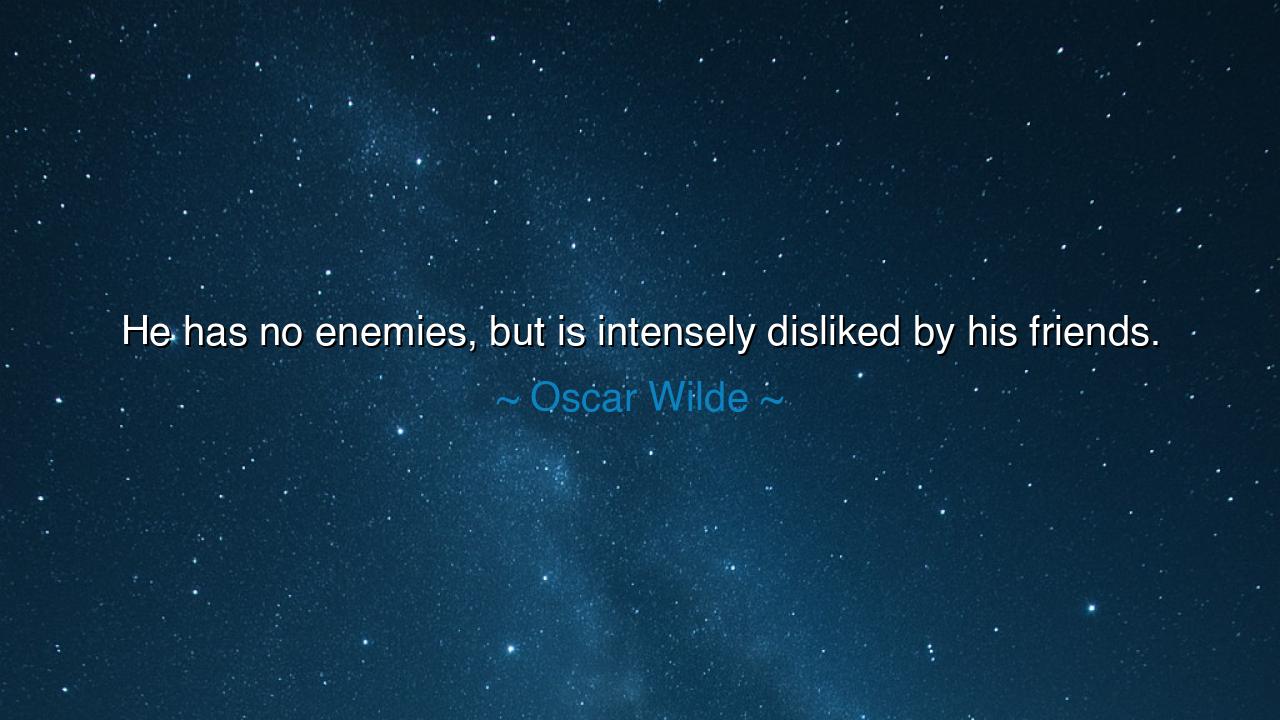
He has no enemies, but is intensely disliked by his friends.






“He has no enemies, but is intensely disliked by his friends.”
Thus spoke Oscar Wilde, the master of wit and mirror of human vanity, whose words glittered with laughter yet cut like a blade of truth. In this paradox lies one of the keenest observations ever made on the nature of character and friendship. To have no enemies may seem a virtue—but Wilde turns the thought upon its head, revealing that sometimes, a life too carefully lived, too cautious, too polished, breeds not admiration but contempt. For there are men who offend none because they stand for nothing; who wound no one because they never fight; who are loved by none because they never dare to love deeply.
Oscar Wilde, a man both celebrated and scorned in his own time, understood the subtleties of human emotion better than most. His words often hid philosophy behind laughter. This quote—though delivered with humor—carries a profound insight: that one who seeks to please all ends by pleasing no one. Enemies, in the grand design of life, are not always signs of failure. They are the marks of conviction. To live without creating resistance is to live without impact. The man who is intensely disliked by his friends, then, is one whose company offends through blandness; his spirit neither warms nor challenges. His flaw is not malice, but mediocrity.
The meaning of Wilde’s words becomes clearer when we consider the contrast he paints: enemies are born of passion, but so are friends. A man without enemies has likely suppressed his passions—his beliefs, his boldness, his individuality—for fear of disapproval. He offends none, for he risks nothing. Yet his friends, though they may tolerate him, come to dislike him for this very emptiness. For friendship, to be alive, requires friction—the spark of difference, the courage to disagree, the warmth of sincerity. Without these, the relationship becomes dull, stagnant, and false.
Consider the tale of Marcus Brutus in the days of ancient Rome. He was known as a man of integrity, so moderate and cautious that he sought always to offend no one. Yet it was this very hesitation, this refusal to act boldly or stand firmly, that cost him the respect of his allies and the love of his companions. When the tides of rebellion rose, he was neither trusted by his foes nor beloved by his friends. His moral restraint, though noble in idea, became weakness in practice. He had no enemies, for he lacked the strength to make them—but neither did he inspire loyalty. His tragedy lies precisely in Wilde’s wisdom: that the man who would avoid conflict altogether cannot kindle deep affection.
To be liked by all is a temptation of the faint-hearted. Such a man measures every word, tempers every truth, and smooths every edge of his soul until nothing remains sharp enough to hold on to. His smile offends no one, but moves no one either. The world honors his courtesy, but forgets his name. For it is only those who are capable of conviction—those who love fiercely, speak honestly, and stand unflinchingly—that awaken both affection and opposition. Better to have a few enemies born of integrity than a crowd of friends born of indifference.
Wilde’s irony, then, hides a moral as ancient as time: that authenticity is the soul of friendship. The friends who truly love you will not mind your flaws, for they spring from the same source as your virtues—your individuality. To hide your true nature in pursuit of acceptance is to build friendship upon sand. It is not cruelty but candor that sustains bonds of worth. Those who risk being disliked for speaking truth will, in the end, be more deeply loved than those who never speak at all.
Let this be the lesson to those who seek to live with grace and meaning: do not strive to be without enemies, but to be worthy of both friend and foe. Live so that your enemies may despise you for your strength, not your deceit, and your friends may honor you for your courage, not your compliance. Speak truth, even when it trembles upon your tongue; stand firm, even when the crowd wavers. Better to be disliked for sincerity than adored for emptiness.
For, as Oscar Wilde teaches, the man who has no enemies has likely made peace with mediocrity—and in doing so, has lost the power to inspire love. The world remembers not the agreeable, but the authentic. Live, then, not to be liked, but to be known, not to be soft, but to be true. For though honesty may cost you comfort, it will win you the only kind of friendship that endures—the friendship born not of convenience, but of respect for the soul’s courage to be itself.






AAdministratorAdministrator
Welcome, honored guests. Please leave a comment, we will respond soon